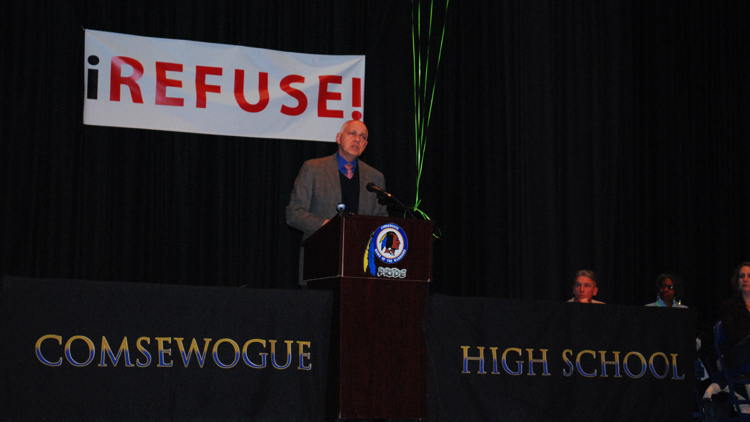Speakers opposed to the state’s new public education policies whipped an audience of hundreds into a furor at Comsewogue High School on March 29, 2014 as Opt-Out supporters, preaching from the stage in the auditorium, vowed to “starve the beast”—calling on parents to have their children skip the rigorous standardized tests and deprive the school system of the data upon which the system depends. Long Island’s own Dee Snyder’s voice blasted from the speakers as his refrain has become this multifaceted group’s mantra: “We’re Not Gonna Take It!”
Many Long Islanders were true to their word. More than 20,000 school children here did not take the first round of state tests that began April 1.
The protest against the Common Core Standards and state testing has reached a fever pitch, sparking a profound debate that is about more than preset standards or global competition, but about the civil rights of our schoolchildren. By coming together, parents, educators and students have brought their growing concerns over the future of public education to the front pages of local newspapers, into social media forums reaching tens of thousands, and into the speeches of those who profess to govern for all.
In March, their collective voices were heard at three major events. Two expert panels on education convened on college campuses on Long Island to discuss the current peril students and teachers face and to propose possible solutions. And at Comsewogue High School, hundreds gathered on the eve of the state tests to communicate one message: We refuse.
Education experts gathered in Long Island University’s Tilles Center on March 10 at a panel hosted by Long Island University’s Dr. Arnold Dodge, the chairman of the Department of Educational Leadership and Administration at LIU-Post and a retired superintendent from the East Rockaway School District. Discussing the theme, “A Return to Common Sense: Restoring Developmentally Appropriate Education to Our Schools,” were a current superintendent, Dr. Bill Johnson; a principal; a mother, Jeanette Deuterman; a teacher, Dr. Anthony Griffin; and student Nikhil Goyal to give a full report from the frontlines of education reform.
Three days later, Stony Brook University hosted its own expert panel, framed by a discussion of the book, Professional Capital: Transforming Teaching in Every School, by Michael Fullan and Andy Hargreaves, both of whom participated in the discussion; Hargreaves in person, Fullan via Skype. Other panelists included Finnish educator Pasi Sahlberg and Carol Burris, South Side High School principal and 2013’s New York Principal of the Year, aptly filling in for headliner Diane Ravitch who couldn’t make it.
The Common Core initiative put into place in New York by Gov. Andrew Cuomo and overseen by the Board of Regents and the State Education Department has been the subject of scathing critique by both parents and educators alike that has not escaped the governor’s attention.
“The flawed implementation of the Common Core curriculum has resulted in frustration, anxiety, and confusion for children and parents,” he has said.
That the implementation has been a disaster is almost universally acknowledged, but where to go from here is something upon which almost no one can agree. The Cuomo administration has put together its own panel to make recommendations.
At Comesewogue High School on March 29, Richard Ianuzzi, president of New York State United Teachers, said that the state education department needs to “stop it, fix it, or scrap it.”
With state tests for grades 3 through 8 beginning April 1, trying to salvage New York education has grown in urgency. State testing is at the heart of the issue, thanks to unrelenting criticism from educators and parents who argue that the tests, upon which the entire Common Core initiative rests, are invalid.
What determines the validity of the assessment is whether the data from the tests can be used to improve instruction. Since teachers are banned from seeing the graded exams their students took, they cannot know where their students’ weaknesses lie. Therefore, they cannot use that information to strengthen their skills. The data instead is used for a rating system to determine the teachers’ effectiveness.
Parents and educators are taking strong issue with that. Under the guidance of Jeanette Deuterman, a mother from Bellmore who spearheaded the Long Island Opt-Out movement, many parents are exercising their rights to opt their children out of the tests this year. Deuterman projected the unofficial tally that more than 20,035 Long Island students refused this year.
“We will not allow the New York State Education Department to use our children to aid in the systematic breakdown of our public education system,” Deuterman said at the Tilles Center. “We will not allow them to use our children to unfairly evaluate our teachers, principals, and schools through their test scores. Parents know that test scores do not correlate with good teaching. The teacher evaluation system is broken, and our children are the ones that have suffered the consequences. Our children will not participate…until significant changes are made.”
Dr. Bill Johnson, superintendent of Rockville Centre Schools, agrees.
“One of the sad things about it is that I truly believe that assessment should be an important component of every child’s life in school,” he said. “But in fact when the state has developed tests that are quite frankly never found to be valid, it is very difficult for me to encourage parents to have their children sit for a nine-hour exam knowing full well that the results are not going to used by anybody in the school district to do anything with at the end of the day.
“As a superintendent,” he continued, “I need to honor the rights the parents have within their school.”
But what about the rights of the child?
Pasi Sahlberg, an author and educator from Finland, speaking at the education forum at Stony Brook University’s Wang Center, dissected the difference between the education system in the United States and the much-lauded system in Finland. Finnish law dictates that between each 60-minute lesson, students are allotted a 15-minute recess. In Finnish culture, children are entitled to recess as an inherent part of their rights.
“Children must play,” Sahlberg stated.
Finnish children do not start academic lessons until they reach 7 years old and do not experience standardized tests until they take their college entrance exams.
In the United States, educational reform financed by federal Race to the Top funds and standardized through the Common Core State Standards Initiative has brought buzzwords like “grit” and “rigor” into the national lexicon, while quietly doing away with play-based developmental learning in the lower grades in favor of an increasingly academic structure. This approach has been sold to the American people by Secretary of Education Arne Duncan as a way to elevate the educational system and produce students who can better compete in the global economy. South Side High School principal, Carol Burris, believes that rationale to be false.
“There is this myth that there was once this great American school system and somehow, we have fallen to the bottom and we are hopelessly falling behind the rest of the world,” Burris said. “The truth of the matter is, since the beginning of international tests, we’ve always been kind of in the middle. Sometimes at the bottom. If you take a look at the performance of American students, it is actually stronger than it’s ever been before. Our graduation rates have never been higher.
“We’re creating this myth that everything is awful, which then gives people permission to just say, ‘Well, let’s blow the whole system up. How can it possibly get worse?’ Well, it can get worse,” she continued.
That’s not the only falsehood, Burris added.
“There’s another myth that somehow rigorous standards are going to solve all of the problems,” she said.
Compared to American standards, she explained that the standards of Finland were “almost skeletal.” Their guidelines were left to the teachers’ discretion based on their experience with their individual students’ needs.
“I’m afraid for [our] kids,” Burris continued. “Because I’m afraid that all of the advances that we’ve made in equity in my school, where teachers have learned to work together collaboratively, where they’ve been able to take a special-ed kid and find a place for him in an international baccalaureate class, that all that good work will be undone by all of these reforms.”
Here, standardization is the goal. Based upon modules offered by the state Education Department and sanctified in these Common Core tests, they are the antithesis of innovative thinking. And innovation is at the heart of the entrepreneurial spirit this country prides itself on.
Sahlberg said that the United States already has an exemplary education system—it just needs to be allowed to flourish.
“I would say all of the successful education systems have one thing in common: They have built their success on American education, innovation and ideas,” Sahlberg said. “Same thing if you go to Singapore, China, or even Canada. This proves that you have everything it takes to build not only schools that work, but to build a system that’s successful. It’s about sharing what you do, what you know; having the policies and reforms in place that are encouraging.
“Your problem is not that you need to invent again with new ideas,” Sahlberg said, “but so you can learn again from one another and make the best use out of the ideas that you already have. If you want proof that the American ideas and innovations of education really work, come to Finland.”
The mother from Bellmore who spearheaded the Long Island Opt-Out movement, Jeanette Deuterman, issued a stern warning to those who she believes are threatening the education of her children.
“To all of the corporations that stand to make billions at the expense of our children, education officials with little or no education experience, Board of Regents members that put status quo over common sense, and legislators that place politics over the protection of our children, watch out!” she said. “The parents of New York are awake. We’re organized. And we will not stop until we return common sense to the education of our children.”

Starve the Beast
Deuterman’s voice was amplified at Comsewogue High School. Torrential rain did little to dissuade the hundreds of people who came out to express their opposition to the state tests this April. Against the backdrop of the aptly named Comsewogue Warriors logo, Superintendent Joe Rella and parent advocate Mark Ferraris hosted speakers such as clinical social worker Mary Calamia, Assemb. Al Graf (R-Holbrook), president of the Port Jefferson Station Teachers Association Beth Dimino, co-founder of Stop Common Core in New York State Yvonne Gasperino, Michael Bohr, the founder of advocate group Badass Parents, and upstate principal Tim Farley, and Westchester County Executive Rob Astorino, the newly announced Republican gubernatorial candidate running on the anti-Common Core platform—whose own kids have opted out of taking the tests.
The lobby was full of advocacy groups such as the Badass Teachers Association to the Guardians, Stop Common Core in New York State, Lace to the Top, and Badass Parents selling T-shirts and stickers, sharing battle stories and offering support to each other.
Tim MacDowell, a concerned father, said that his Longwood fourth grader Lucas will refuse the test this year. His son took the test last year.
“I didn’t want him to,” MacDowell said, “but I thought I was alone. I didn’t know any of this existed. And he passed. But I don’t know what he passed. He got a 3 on the ELA [English Language Arts] and a 3 on the math. But as a parent, one who really rides him hard, I don’t know what that means. I’d like him to get a 4, but I don’t get any feedback. The teachers don’t get any feedback. They don’t individualize the results. They just tell me he got a 3. It’s useless.”
MacDowell certainly doesn’t feel alone any longer. These protesters have little common ground in other issues but in this increasingly polarized political atmosphere they stand together against Common Core.
Richard Ianuzzi, president of the New York State United Teachers, hammered home that message.
“The New York State United Teachers will stand behind every one of our members and every parent in this audience and every parent in New York State who makes that choice,” he said. “The moment a choice is taken away from a parent, that’s the moment when public education is destroyed. The moment when choice is taken away from a teacher, then public education is destroyed.”

A vocal opponent of this reform, Dr. Mark Naison, history professor and chair of African-American Studies at Fordam University and co-founder of the Badass Teachers Association, railed against what he called the “Walmart-izaton of Education.”
“It implements a kind of authoritarianism that we’re seeing more in the workplace,” he said. “It is unacceptable. Children need freedom, they need self-expression, they need space and they need to be allowed to make mistakes; they need to learn from those mistakes.
“This issue is not going away,” he continued. “We have found a fault line in education policy that is so profound that we’re going to flip the script in terms of how this issue is going to be regarded in American politics. Some people think it will take a year. I think it will take five to 10 for us to win it.”
Naison stopped to take in the surroundings: a group encircling a candidate for governor, parents and children awash in green shoelaces and t-shirts proclaiming “I refuse!” and a camaraderie born of a shared cause.
Naison smiled at the audience assembled at Comsewogue.
“I see this as a step forward,” he said.



























